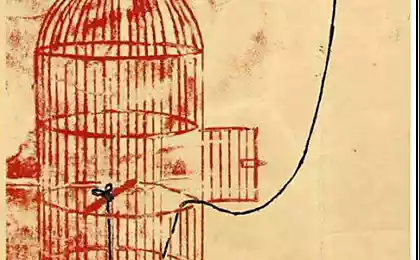216
Invisible tests of power: how one gesture determines your price

In the higher echelons of power, there are unwritten rules of the game that are not studied in universities. One careless move, one wrong reaction to a seemingly harmless gesture - and you are no longer a player, but a pawn on someone else's board.
Imagine you’re meeting an influential person for the first time. The conversation is just beginning, the atmosphere is relaxed. And suddenly he hands you a gift - a book, an expensive pen, a souvenir. No reason, no reason. Your first reaction will reveal much more than hours of psychological testing.
Anatomy of the invisible test
This technique has deep roots in diplomatic practice and the psychology of power. Robert Cialdini’s research in social psychology shows that the principle of reciprocity is one of the most powerful tools of influence. When a person receives something without a request, the mechanism of “social debt” automatically activates in his mind.
How it works in practice
An unexpected gift is not a manifestation of generosity. It is a diagnostic tool that instantly reveals a person’s inner hierarchy. Those who are used to being in a position of strength, accept the gift calmly, without unnecessary emotions. Their gratitude is natural, but not excessive. They understand that nothing is done for nothing in the world of high stakes, but they do not look for hidden meanings where there are none yet.
But a person with an unstable internal position reacts completely differently. He starts fussing, apologizing, immediately looking for ways to "repay." At this point, the balance of power is already broken, not by money, not by threats, but by simple psychological displacement.

The Psychology of Submission Through Gifts
Dr. Dan Ariely, in his research on behavioral economics, proved that even minimal “gifts” can radically change a person’s perception of a situation. The phenomenon of anchoring works not only with prices but also with social relationships.
“Gifts knock down only those who have no support inside. Real power begins where the need for approval ends. ?
History knows many examples of the use of this technique. Cardinal Richelieu masterfully used “accidental gifts” to identify potential allies and opponents at the court of Louis XIII. In modern diplomacy, this method is called “soft sensing” – when you need to understand the true intentions of the negotiating partner without direct questions.
Three Types of Responses to an Unexpected Gift
Force response: Thank you and continue the conversation in the same way. No further questions, no attempts to “pay off” immediately. Man takes the gift for granted, but without arrogance.
Uncertainty reactions: Lots of questions, embarrassment, trying to find a way to thank you. “What does this mean?”, “What can I repay?”, “Are you sure?” are all signals of inner instability.
Suspicion response: Immediately seeking ulterior motives, refusing to accept a gift or accepting it with apparent disbelief. Paradoxically, this is also a sign of a weak position – an inability to act in the face of uncertainty.
Mechanisms of psychological subordination
Neuropsychological studies show that receiving an unexpected gift activates the same centers in the brain as in the formation of addiction. The dopamine system triggers a chain: a pleasant sensation → a desire to repeat → a willingness to make concessions for the sake of repetition.
344768
But the real danger is not in the gift itself, but in the change of internal status. A person unconsciously begins to perceive himself as a “debtor,” even if no one asks him to. This is the most effective submission when a person puts himself in a dependent position.
Case from practice: "Golden watch of the Senator"
In the 1990s, an influential U.S. senator became famous for his habit of giving expensive watches to new colleagues "in honor of acquaintance." Those who accepted the gift naturally became its allies. Those who fussed and tried to thank him immediately, invariably fell into the orbit of his influence as junior partners. And those few who politely refused remained independent players, but also potential opponents.
Next Next post: How to pass an invisible test
Elegant acceptance strategy
If you receive an unexpected gift from a powerful person, remember: your reaction will determine the nature of the relationship. The ideal strategy includes several elements:
- Sincere but restrained gratitude without unnecessary emotions
- Lack of immediate attempts to “pay off”
- Continuing the conversation without focusing on the gift
- Demonstrate that you are accustomed to attention signs
Avoid common mistakes that instantly reveal your weak position:
- Excessive admiration for the gift
- Trying to find a way to thank you immediately
- Questions about the reasons for the gift
- Demonstrations of embarrassment or awkwardness
- How You Are “Unaccustomed” to Gifts
How to use this tool yourself
Understanding the mechanism allows not only to protect against manipulation, but also to use this tool for diagnosing people. A small, seemingly random gift can tell a lot about a person:
Giving is not to get something in return, but to understand who you are dealing with.
The "diagnostic gift" technique
Choose a small but high-quality item - a book, accessory, souvenir. It is important that the gift is not too expensive (this is already bribery) or too cheap (this is an insult). Present it for no special reason, just as a “sign of acquaintance”.
Watch the reaction. Someone who accepts the gift calmly and with dignity is potentially your equal in status. Those who fuss are already psychologically dependent. Anyone who refuses is either very strong or suspicious to the point of paranoia.
The historical roots of the phenomenon
The practice of “diagnostic gifts” is rooted in ancient diplomacy. In ancient Rome, there was the institution of munus, obligatory gifts exchanged by patricians to establish hierarchy. He who could not adequately respond to the gift automatically recognized his subordinate position.
In Japanese culture, “omiyage” – souvenir gifts – still function as social sensing. By the way a person receives and responds to such gifts, the Japanese determine their place in the informal hierarchy.
Modern variations
In the modern world, “diagnostic gifts” take various forms: an unexpected invitation to a restaurant, an offer to use a service car, access to a closed event. The essence remains the same – how a person reacts to an undeserved good.
Power Begins with Internal Resilience
True power is not to give or receive gifts. It is the ability to remain independent of external influences. He who understands the game but does not become a hostage has already won the most important battle: the battle for his own independence.
Remember, in a world of high stakes, every gesture matters. But it is even more important to understand that your value is not determined by what you are given, but by how you accept it.
Glossary
anchoring
A psychological phenomenon in which people rely too heavily on first-hand information when making decisions.
Reciprocity principle
A social norm in which people feel an obligation to respond positively to the positive actions of others.
Soft sensing
Diplomatic technique of indirect clarification of the positions and intentions of the partner without open questions.
dopamine system
The neurochemical system of the brain responsible for motivation, pleasure and habit formation.
Social debt
A psychological condition in which a person feels an obligation to “repay” for a service or gift received.
Diagnostic gift
A gift given not for the sake of giving, but to study the reaction of the recipient and determine his psychological type.
Types of women that scare off most men
Pavel Durov and the Challenges of Digital Diplomacy: Between Privacy and State Security























